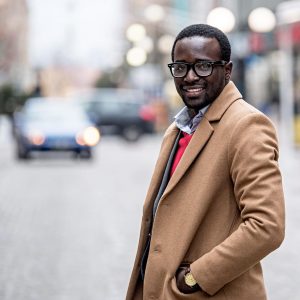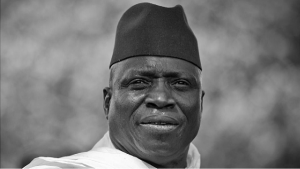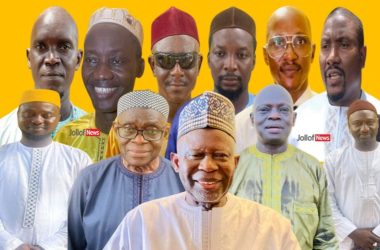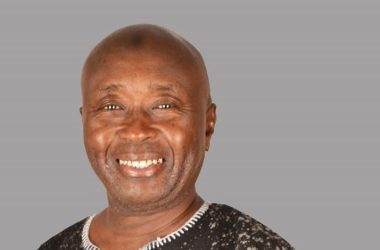
(JollofNews) -Warneford Hall, OX3 7XA, Oxford, UK (2017-01-27) – In his book The Revolution Betrayed, Leon Trotsky, the Russian Marxist and revolutionary theorist writes: “Whereas revolution is the locomotive of history, reactionary regimes especially totalitarian regimes…act as a colossal brake on human consciousness.”
For the past weeks, before the departure of Africa’s most brutal dictator, Gambians all over the world experienced a brake in their consciousness of the future of what used to be one of the most peaceful countries in the world.
From one dictator to another, Africa is home to many of the totalitarian regimes around the world. Interestingly, some of these dictators have become herpes of geopolitical debate, while others have remained subjects of kitchen gossip. How did Africa’s most mysterious and brutal president fall from grace to grass?
Until recently, people in the tiny West African country called The Gambia had never mustered the courage to criticize their mysterious President, Yahya Jammeh. Born in Kanilia, a small village just stone’s throw away from Senegal, Jammeh came to power on a fashion parallel to George Orwell’s Animal Farm: He, together with a handful of amateurish soldiers, overthrew a “democratic” government whose ministers plundered the country’s meager resources. Few years after the revolution, Jammeh succeeded in creating a Bonapartist regime; and consequently, began to subjugate national politics until his recent political fiasco.
Gambia, until few weeks ago, was a political desert with no real political oxygen, no free press, and no pathway for dissenting views. As a result, political discourse is more or less restricted around the kitchen table. This does not mean that the country is an isolated island, invulnerable to external and internal pressures. In fact, Jammeh’s tragedy is as much external as it is internal.
Jammeh’s external tragedy stemmed from the fact that his foreign policy was a political disaster, given the nature that he was a dictator. Instead of learning from the mishap of Africa’s post-independence Marxist-Leninist leaders who chose to bandwagon with the Soviet Union–the communist bloc–Jammeh failed to read the writings on the wall: He chose to align with Russia–an act that ruffled feathers in Washington and Downing Street–and this irked the last remnant of the patience the West had with his demagogueries.
It is not that the West does not like or support dictators. No! Then it wouldn’t support Egypt, Bahrain, Saudi Arabia, etc–the latter being one of the most brutal regimes in the world (Note: There are two Saudis: that of politics and that of religion. When it comes to religion, Saudi is the cradle for religious purity, but when it comes to politics, Saudi is but a wannabe regional power driving disastrous domestic and foreign policies–the Swedish (our) Foreign Minister, Margot Wallström, would agree with me on the domestic level).

Jammeh’s tragedy is not that he was a dictator; his tragedy ranges from the fact that he chose to be the wrong dictator by alienating and antagonizing the West. Given the need to counter Russia’s influence around the world, The Gambia included, the West could have imagined a benevolent dictator in the person of Yahya, had he not brought himself closer to Russia. But then again, he led a sovereign state, and as far as the Westphalian sovereignty of the state is concerned, he had the right to choose which country to align with. This goes without saying that there are costs – perhaps Jammeh’s foreign policy-makers needed to work a bit harder on cost-benefit analysis.
Demba Baldeh (Facebook name: DK Baldeh), a commentator on global issues, sums it all: “Jammeh, by making similar moves like the Philippines’ President [Rodrigo Duterte] to strength ties with Russia and China, by declaring the West as a hostile force, and by leaving both the ICC and the commonwealth, he clearly entered into the geopolitical zone for which there are costs.” What DK Baldeh is saying is that Jammeh’s strategic thinking has cost him his presidency.
The other external factor that cost Jammeh his political career is the beef he had with Senegal. During every national election for the past twenty years, a good number of people had been coming from Casamance to vote for Jammeh. For these lumpenproletariats, as Karl Marx would call them, uneducated and with high political bankruptcy, Jammeh was the right man. In the run up to the recent election, Senegal strongly waged an anti-Jammeh crusade, urging its masses of people in impoverished Casamance not to go and vote. The people listened, and this dealt Jammeh a great blow. The question why Senegal dislikes Jammeh is open for debate. One thing is clear: Senegal’s foreign policy towards The Gambia is built on permanent interests, not permanent friendship – unfortunately, so is often the case in international politics.
Internally, Jammeh is the very reason for his own demise. Local political analysts speculated that he funded the Gambia Democratic Congress (GDC). His calculation was that anytime the opposition parties call for election boycott, GDC would refuse. To sum it all, Jammeh funded the GDC in order to create instability within the opposition radar, analysts argued. This became evident when the GDC refused to send top representatives at an alliance-formation meeting. This move added impetus to local analysts’ suspicion about the GDC-Jammeh connection. Due to poor campaign and overrated confidence, Jammeh’s campaign message failed to attract voters. Most of his supporters crossed the carpeted to the GDC. If GDC is Jammeh’s creation, then Jammeh is the definition of political faux pas.
A self-construction tribalist, Yahya Jammeh went against the grain during a rambunctious outburst on the nation’s only TV and upset the Mandinka ethnic group by arguing, with dogmatism, that the Mandinkas (people who belong to the Mandinka ethnic group) are not Gambians. I will leave the counter-arguments to ethno-historians and focus on how this is tantamount to political suicide.
First, it is important to note that the Mandinkas constitute the majority of the population in The Gambia; second, Jammeh’s 22-year rule could not have been possible without the support from the Mandinka ethnic group; and third, this attack had indeed helped in unifying the Mandinkas. Given the nature of Gambia’s political nomadism and identity politics, a united Mandinka crusade, armed with a We-vs-Them slogan is but a cataclysm, combined with other factors, strong enough to bring down a brutal dictator, given that elections are not rigged.
In addition to attacking the Mandinkas, Jammeh clamped down on peaceful protests, killed Solo Sandeng, a freedom fighter, and imprisoned Ousainou Darboe, a Mandinka and leader of the biggest opposition party, the United Democratic Party (UDP). Analysts have continued to argue that this move was the last straw that broke the camel’s back.
A dedicated sexist, Jammeh did not spare the poor and lovely women folk either. After punching the Mandinkas in the face, he went on to lambast the women, talking about skin bleaching. A president has to remain a president: You cannot go on preaching about morality when a majority of the population goes to bed without food, when the country is experiencing its worst brain drain ever, and young people are continuing to die at sea.
Yahya Jammeh was not only brutal, but he had the supreme wisdom of a junky philosopher who failed to understand that #GambiaHasDecided, and that vox populi vox dei–the voice of the people is the voice of God. But The Gambia is now set for a new political era, which, hopefully, will see the decommissioning of mindsets and the establishment of cosmopolitan democracy. Knowing that the new government has inherited a bad legacy buffeted by economic crises and tribalism fueled by Yahya Jammeh, Gambians have to exercise some patience.
In the meantime, Gambians will continue to remember Yahya Jammeh as the tribalist president who fought tribalism; as the pseudo pan-African president who, in his last days as president, hated the African Union and ECOWAS; and finally as the criminal president who fought criminality in The Gambia – a man of many colors.
Amat Jeng is a naturalized Swedish citizen who studies International Relations (Studies) and English at the Dalarna University, Sweden and now studies at Oxford as an Erasmus fellow. Email: h15amaje@du.se / amat.jeng-2017@brookes.ac.uk




